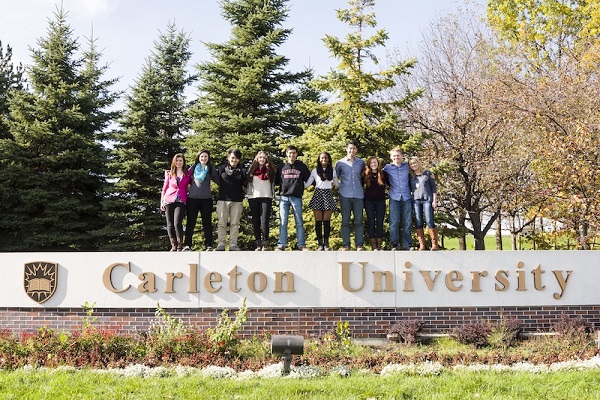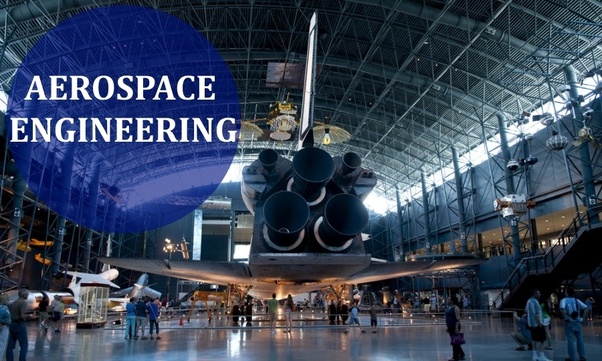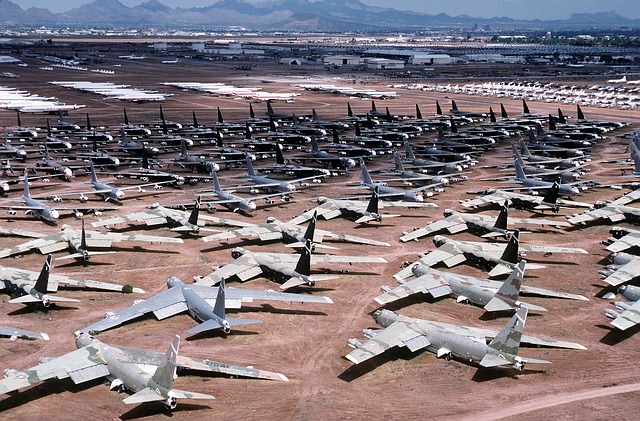Founded in 1942 and situated just minutes away from central government headquarters in Ottawa, Ontario, Carleton describes itself as Canada’s ‘capital university’.
It was the first private, non-denominational college in Ontario, established largely as a way for young people adversely affected by the Depression to continue their formal education.
Carleton is now a public university with an operating budget of around $390 million. It receives additional research funding of close to $60 million, and awards scholarships and bursaries worth up to $18 million.
Just south of the city centre, the university’s campus sits within 100 acres of land and lies between the Rideau River and the historic Rideau Canal. It also has a five kilometre network of underground tunnels that connect all of the university’s buildings.
Enrolled at Carleton are around 28,000 students from over 100 countries.
The university offers 65 degree programmes in more than 50 academic disciplines, and is particularly renowned for its courses in journalism, public affairs, international affairs, architecture and technology.
It comprises many prominent buildings, including the 22-story Dunton Tower, the Kailash Mital theatre, which seats up to 444 people, and the Minto Centre for Advanced Studies in Engineering.
The campus itself is surrounded by many well-known tech companies and the university prides itself on its graduates ‘entrepreneurial spirit’.
It has an alumni network numbering over 130,000. They include Peter Grünberg, Nobel Prize in Physics laureate in physics (2007), Gavin McInness, co-founder of Vice media, and the developer and architect David Azrieli.
Program Description
- The Bachelor of Engineering in Aerospace Engineering is a 4-year program at Carleton University.
- Students will have the opportunity to apply to the Co-operative Education Program.
- Students learn the development of analytical, computational, and hands-on engineering and design skills related to the aerospace field.
- There are four streams in the Aerospace Engineering program:
- Aerodynamics
- Aerospace Electronics and Systems
- Space Systems Design
- Statistics
- This program gives the following areas:
- A wide range of topics offered within four streams of study
- A unique and challenging final-year design project that emulates a design office project at an aerospace firm
- An emphasis on problem-solving skills, and hands-on laboratory and design work
- Excellent scholarships for high-standing students.
- Students will have the opportunity to participate in a variety of great design projects.
- The BEng program in Aerospace Engineering is fully accredited by the Canadian Engineering Accreditation Board.
- The student to faculty ratio is 9:1 which bridges the gap between faculty and students.
- After graduating from this program, students will meet the educational requirements for registration as a professional engineer.
- Carleton University has an acceptance rate of 21%, compared to other Canadian universities
Program Highlights
| Degree Type Offered | Bachelor |
| Duration | 4 years |
| Fees | $ 129604 for 4 years |
| Delivery Type | Full Time |
| Admission Intake | Fall (Deadline – Apr 1) |
| Language Proficiency | TOEFL,IELTS,PTE |
| Program URL | http://admissions.carleton.ca/programs/aerospace-engineering |
Eligibility & Entry Requirement

Academic Eligibility:
- Students will need a secondary school or high school graduation certificate with a minimum of 12 years of study.
- Students must have transcripts from their senior high school along with their graduation diploma or certificate, and any graduation exam results.
- If English is not the students’ first language then they must provide proof of English competency.
Indian Student Eligibility:
- Students required to passed Class 12th with a percentage of 74-76% (Major), 78-82% (Honours) from one of the following boards:
- All India School Certificate (CBSE)
- Indian School Certificate (CISCE)
- Students must have Knowledge in the following Subjects:
- Chemistry
- Physics
- Math
- Calculus
Required Document List
Following are the required Documents:
- CV/Resume: Outline of academic achievements and/or awards, publications, relevant work, and/or volunteer experience.
- Transcript: A PDF copy of all post-secondary transcripts within the application or in Carleton Central.
- Letter of Reference: Referees (Teachers, guidance counselors, or Professors) should comment on academics and that references should submit along with the application system.
- Statement of Intent: Explain the reasons or intentions for pursuing studies in this program, including a description of prior experience.
- Writing Sample: Students applying for a job, internship, may be asked to provide a writing sample that allows an employer or graduate program to judge student ability to convey a written message.
- Aptitude test results: Used to make inferences about competencies, capabilities, and future performance on the job of the students.
- Preference Form: Some departments require students to fill in a preference form that will ask to outline their preferences for the program specialization, research area, or faculty supervisor.
- ELP Scores: Students have to submit their English language proficiency scores like IELTS, TOEFL, or other test scores.
Application Deadline
CHECK ELIGIBILITY
| Event | End Date |
| fall | Apr 1, 2021 |
Scores Required
86 / 120
Avg. Score in
TOEFL
6.5 / 9
Avg. Score in
IELTS
60 / 90
Avg. Score in
PTE
Fees & Funding
Tution & Application Fees
| Year | Year 1 | Year 2 | Year 3 | Year 4 |
| Tuition Fees | $29848 | $29848 | $29848 | $29848 |
| Health Insurance | $540 | $540 | $540 | $540 |
| Other Fees | $2013 | $2013 | $2013 | $2013 |
| Total Fees | $32401 | $32401 | $32401 | $32401 |
Living Costs
| Head | Avg Cost Per Year |
| Room(On Campus) | $ 8353 |
| Room(Off Campus) | $ 6450 |
Ranking

Times Higher Education 2021
Ranked #201 / 1001
Engineering [ International ]
Scholarship Grants & Financial Aids
| Name | Amount | International Students Eligible | Application Deadline |
| VueVille Future Technology Scholarship | $ 1000 | Yes | Sep 30, 2020 |
| Go Clean Scholarship | $ 3500 | Yes | Dec 31, 2020 |
| (ISC)² Women’s Cybersecurity Scholarships | Variable | Yes | Feb 19, 2021 |
| Collegedunia $150 Scholarship Program | $ 150 | Yes | N/A |
VISA & Work Study
VISA
- Students need a Study Visa to stay in Canada. After receiving the study permit, they can apply for the Temporary Resident Visa (TRV) or Electronic Travel Authorization (eTA).
- The cost of the Study Visa is 112 USD and valid for the length of the study program, plus an extra 90 days.
- At the time of VISA application, students need to provide various documents:
- Application form and Study Plan.
- Completed IMM 1294 (Application for Study Permit Made Outside of Canada).
- Letter of Acceptance(Student Information for a Study Visa from Carleton University).
- Valid Passport (photocopy or scan).
- Biometrics (fingerprints and photo)
- Financial Evidence.
- No criminal record certificate
- Results of a medical exam.
Work Study
- The Work-Study Program provides students a chance to get at a part-time on-campus job.
- In On-Campus program students may work up to a maximum of 192 hours for the work-study period and earn up to a maximum of $3,000 for the fall/winter session.
- The work-study hourly wage is $15.00/hour plus vacation pay.
Career and Placement after Course
- After this program students have opportunities in:
- Aerospace design and manufacturing industry
- Airline and space operations
- Government research laboratories
- Aircraft certification and accident investigation authorities.
Bachelor of Engineering in Aerospace EngineeringChange Course
| About this course | |
|---|---|
| Duration | 4 Years |
| Level | Bachelors Program |
Course Description
- The Aerospace engineering program emphasizes the development of analytical, computational, and hands-on engineering and design skills related to the aerospace field
- The broad range of topics and applications included in this discipline are covered in four main streams: Aerodynamics (aerospace propulsion and atmospheric flight); Aerospace Structures (lightweight vehicles for flight and space travel); Aerospace Electronics and Systems (aircraft control, communication and navigation systems); and Space Systems Design (astronautics and space/satellite technology)
- All four streams emphasize the development of practical and problem-solving skills based on hands-on laboratory and design work
RankingUniversity Rankings#501-600Universities Rankings
– ARWU (Shanghai Ranking) 2020#601-650World University Ranking
– QS 2021#501-600University Ranking
– THE (Times Higher Education) 2021#471Global Universities
– US News & World Report 2021View All RankingFees & ExpensesCADINR1st year tuition fees
| Fees components | Amount |
|---|---|
| Tuition & fees | INR 22,56,364 |
Other expenses in 1st year
| Fees components | Amount |
|---|---|
| Hostel & Meals | INR 6,43,108 |
| Insurance | INR 41,573 |
| Books and Supplies | INR 80,836 |
| Personal Expenses | INR 1,15,480 |
| Total | INR 8,80,997 |
Calculated at the exchange rate of 1 CAD = INR 57.74|
Tuition & expenses were last updated on 3ʳᵈ March 2021Entry Requirements
| Entry requirements for this course | |
|---|---|
| Class 12th | 75%Applicants should have passed Class 12th with a percentage of 75-85% from one of the following boards: All India School Certificate (CBSE)Indian School Certificate (CISCE)One of the state board certificatesPrerequisites: Math: XII MathsChemistry: XII ChemistryPhysics: XII PhysicsThe admission average will be calculated on 5-6 academic subjects completed in the XII level |
| Exams | TOEFL : 86With 22 in writing and speaking, 20 reading and listeningIELTS : 6.5With a minimum of 6.0 each PTE : 60With a minimum of 60 in each Communicative Skill |
Top Universities for Aerospace Engineering in Canada

Aerospace is increasingly seen as one of the highest performing industries in Canada with over 700 aerospace companies and 85,000 skilled professionals working out of the country. With this number, taking up aerospace engineering courses in Canada is a good professional choice for career-oriented individuals who are determining the best field to focus on.
Graduates of aerospace engineering courses in Canada often end up working for private companies in aerospace parts technologies and various agencies in the government such as the Canadian Space Agency, where they are tasked to design and improve current spacecraft technology. Some aerospace engineers, however, can be hired by non-traditional industries like the motor vehicle industries where they design aerodynamic cars. If you are interested in taking up a Bachelor’s degree or proceeding with a Master’s degree in the same field, read on for our best aerospace engineering university in Canada.

1. Carleton University
Carleton University is a research and teaching institution founded in 1942 by the community to meet the needs of the veterans who were returning home from World War II. Currently, the university has over 31,000 students and is one of the leading institutions in quality education especially in the fields of humanities, engineering, computer sciences, and international business.
Carleton’s Master of Applied Science (MASc) and Master of Engineering (MEng) degrees for aerospace engineering are offered through the Ottawa-Carleton Institute for Mechanical and Aerospace Engineering. One of the advantages in enrolling in a Master’s degree in aerospace engineering at Carleton is the research collaborations and funding arrangements with several institutes and major industry partners such as the Atomic Energy of Canada Ltd, Pratt & Whitney Canada Inc., and Magellan Aerospace.
2. Concordia University, Montreal
Concordia University, Montreal is a public comprehensive university with more than 50,000 students. The university is a result of the merger of Loyola College and Sir George Williams University in 1974. Concordia University has ranked number one among the comprehensive universities for humanities grants and social sciences.
Aside from the Bachelor’s degree in aerospace engineering, Concordia University offers an MEng specializing in aerospace engineering. Students taking up a Master’s degree have access to state-of-the-art computer facilities and are trained with various aerospace industry partners such as Aveos Fleet Performance, Bombardier Aerospace, Canadian Space Agency (CSA), and Pratt & Whitney Canada. The following areas of specialization that can also be chosen are aeronautics and propulsion, avionics and control, structures and materials, and space engineering.
3. McGill University
McGill University is a research university founded in 1821 and now has over 40,000 students. It is recognized as an institution with an excellent teaching and research program and is home to 145 McGill students who have been awarded a Rhodes Scholarship. The university has also been awarded as the number 1 among the medical-doctoral universities for 14 consecutive years.
McGill University offers a program on Minor Aerospace Engineering. This Bachelor’s degree offers a capstone aerospace design project in the last year of the program in collaboration with local aerospace companies. Those who want to study further can take up a Master’s degree in aerospace engineering that is offered by the Department of Mechanical Engineering. Students can specialize in any of the four areas, namely: aeronautics and space engineering, avionics and control, aerospace materials and structures, and virtual environment.
4. Royal Military College of Canada
The Royal Military College of Canada (RMC) is a military college of the Canadian Armed Forces (CAF) where military officers can pursue a degree while undergoing training. Eligibility for undergraduate and graduate students includes being a current serving member of the CAF, an honorably released member of CAF, an employee of The Department of National Defence (DND) or another Federal government department, or a spouse of a member of CAF, although they also accept civilians for graduate studies. It was founded in 1874 and now offers degrees in arts, science, and engineering.
Professionals who wish to take up a Master’s degree in aerospace engineering at RMC can apply for a Master of Engineering or Master of Applied Science for aeronautical engineering. Advanced studies in various fields are offered including dynamics and control, thermo fluids, solid mechanics and materials.
5. Ryerson University
Students who wish to pursue a Master’s in aerospace engineering in Canada can find a wide variety of opportunities at Ryerson University. Ryerson or RyeU is a public research university in Canada with over 45,000 students. The university was founded in 1948 and had just 250 students in its founding year. It received official university status in 1993 and has been one of the leading institutions for research and innovation ever since.
Ryerson offers MASc, MEng or Doctor of Philosophy (Ph.D) degrees in aerospace engineering. Some of the research areas for its programs are on aircraft conceptual design, multidisciplinary design optimization, cooling of gas turbine blades and thermal management in aerospace systems, robotics, control and aircraft systems, spacecraft orbit, sun sensors, star trackers, sensor processing, and rover navigation. The Department of Aerospace Engineering has established partnerships with various aerospace organizations and has hugely contributed to the development of strategic plans on the provincial, national, and international levels.
6. University of Toronto
The University of Toronto (U of T) is a research university founded in 1827. It has 3 campuses in Mississauga, Downtown Toronto, and Scarborough, and is home to over 90,000 students. U of T has ranked successfully in several international institution rankings including the Times Higher Education, Shanghai Jiao Tong, QS World University Rankings, US News Best Global Universities, and the NTU Ranking.
Interested students who wish to enrol for aerospace engineering courses in Canada can apply for MASc, MEng and Ph.D. degrees at U of T. Research areas include aircraft flight systems and control, computational fluid dynamics, aerodynamic shape optimization, multidisciplinary optimization of aircraft, and spacecraft dynamics and control.
7. University of Windsor
The University of Windsor (UWindsor) is a comprehensive research university that offers various undergraduate and graduate programs including law, business, engineering, science, and education. It was founded in 1857 and approximately 15,00 students are enrolled annually.
Graduate students who wish to pursue a Master’s degree in aerospace engineering can apply for a MASc and MEng in mechanical engineering with specialization in aerospace. Its MASc program is research-based where students are required to complete 4 graduate-level courses and a thesis. The MEng program, on the other hand, requires students to complete eight courses. At Windsor, graduate students have the opportunity for professional development: scholarships and graduate assistantships are available by application.
Leave a Reply